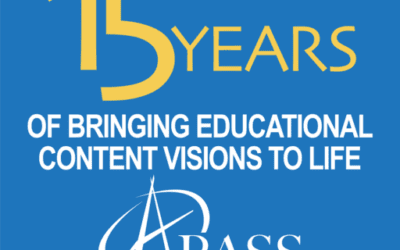
As the A Pass Content Team deliberated our Professional Development series for our contractors, it was obvious from an early stage that we wanted to avoid the typical lecture-audience idiom, or even the “how-to” video so familiar on YouTube these days. Instead, we wanted to stress the interactivity of the workshops and actually get our associates involved in not only learning (or giving ear-service to) the practical skills they will use daily in A Pass’ projects, but demonstrating those skills as well. The manner in which we chose to have the attendees show these skills may strike you as somewhat out of character for a group of serious-minded education professionals – we decided to play a game.
Incorporating Games
Games and play are frequently stressed as important, even essential, aspects of learning at early grade levels. There are articles, websites and even university-level conferences dedicated to the furtherance of these ideas. Yet many of these concepts seem to fade as students age, and commonly disappear altogether by high school, and almost certainly beyond. While there are endless possible reasons for this, including the increasing seriousness with which we perceive ourselves as we age, it could plausibly be posited that the same values generated by lessons imbued with play/games for young children – creativity, collaboration, confidence – also resonate through similar activities for older children and adults as well. Including games in a professional development program can increase engagement.
Using Mnemonics Exercises
It’s no secret that nursery rhymes from our early years impart informational nuggets that stay with us for decades thereafter. Similarly, simple mnemonic exercises that range from optical physics (Roy G. Biv), music (Every Good Boy Deserves Fudge and its variants) to industrial arts (righty-tighty; lefty-loose-y) translate pieces of information into something that the brain (and perhaps the soul) finds palatable enough to keep around. A quick poll of my colleagues old (or young) enough to remember can still cite the preamble of the United States Constitution to the melody of the Schoolhouse Rock tune (In this writer’s humble opinion, Schoolhouse Rock has never been bettered as an extracurricular vehicle for making U.S. History, Government and Civics, Multiplication, or Grammar accessible to elementary school students!).
Putting the Fun Back in Professional Development Programs
For various and sundry reasons, we learn better when we have fun. According to Brian Blade, Director of Healthy School Communities, a program of the Association for Supervision and Curriculum Development, an educational leadership organization, “Brain research suggests that fun is not just beneficial to learning but, by many reports, required for authentic learning and long-term memory.” Far from the criticisms that perceive the inclusion of fun in education as being clownish, “touchy-feely” and, perhaps, irresponsible, fun reduces physical and mental anxiety in very real and measurable terms, which is conducive to learning at all ages. When these barriers are overcome, engagement with content and material naturally increases. A truism? Perhaps, but all too soon forgotten once cap and gown are attained and disposed.
Fun is frequently dismissed at higher and professional education levels, often because of its connotations of child-like behavior, lack of rigorous standardization, and decreased productivity. Yet the same biological and mental processes: the reduction of anxiety, the increased levels of endorphins, epinephrine (adrenaline), and dopamine, etc. occur in adults exposed to different aspects of “fun”: laughter, positive cueing, and the joy of discovery.
How About a Scavenger Hunt in a Professional Development Program?
We chose our game, a “scavenger hunt” of sorts, to camouflage a series of performance tasks, each of which was aligned to a specific pre-determined learning objective. The Learning Objectives were finite, could be measured on a rubric, and represented the practical acquisition and application of skills our Content Team deemed necessary for associates to have when participating and collaborating with our staff on projects with our clients. While the attendees to the workshop were doing these tasks simultaneously, this was not a race to the finish – no awards were given for speed – the only competition was within the attendees themselves as they strove to get to the next level of the game by employing the knowledge they had learned from earlier in the workshop.
We’re hoping that each attendee to the A Pass Professional Development series on Google Drive found their new “discovery” hidden at each level to be a “fun” aspect of the exercise. Additionally, it is anticipated that the skills that they’ve acquired and demonstrated here will prove invaluable to them through their future A Pass projects.
by Stephen Gibson, Director for Social Studies Development at A Pass Educational Group




